Uses
Latanoprost is used to treat high pressure inside the eye due to glaucoma (open angle type) or other eye diseases (such as ocular hypertension). It is similar to a natural chemical in the body (prostaglandin) and works by regulating the flow of fluid within the eye which results in lower pressure. Lowering high pressure inside the eye helps to prevent blindness.
How to use Latanoprost Drops
Use this medication in the affected eye(s) as directed by your doctor, usually once daily in the evening. Do not use latanoprost more often because it will not work as well.
To apply eye drops, wash your hands first. To avoid contamination, do not touch the dropper tip or let it touch your eye or any other surface.
If you are wearing contact lenses, remove them before using this medication. Wait at least 15 minutes before replacing your contact lenses.
Tilt your head back, look upward, and pull down the lower eyelid to make a pouch. Hold the dropper directly over your eye and place one drop into the pouch. Look downward, gently close your eyes, and place one finger at the corner of your eye (near the nose). Apply gentle pressure for 1 to 2 minutes before opening your eyes. This will prevent the medication from draining out. Try not to blink or rub your eye. Repeat these steps if your dose is for more than one drop. If directed to use this medication in both eyes, repeat these steps for your other eye. Do not rinse the dropper. Replace the dropper cap after each use.
Wait several minutes for your vision to clear before driving or operating machinery.
Use this medication regularly in order to get the most benefit from it. Remember to use it at the same time each day. Keep using latanoprost even if you feel well. Most people with glaucoma or high pressure in the eye do not feel sick.
If you are using another kind of eye medication (such as drops or ointments), wait at least 5 minutes before applying other products. Use eye drops before eye ointments to allow the eye drops to enter the eye.
Side Effects
Blurred vision, burning/stinging/itching/redness of the eye, feeling as if something is in the eye, changes in eyelash number/color/length/thickness, eyelid changes/skin darkening, dry eye, lid crusting/discomfort, or increased sensitivity to light may occur. If any of these effects last or get worse, notify your doctor or pharmacist promptly.
This medication may slowly (over months to years) cause brown discoloration of the colored portion of the eye (iris). If you are using latanoprost in only one eye, only that iris may change color. This color change may be permanent but the long-term effects are uncertain. Notify your doctor if this occurs and schedule regular eye exams to monitor it.
Remember that this medication has been prescribed because your doctor has judged that the benefit to you is greater than the risk of side effects. Many people using this medication do not have serious side effects.
Tell your doctor right away if you have any serious side effects, including: eye pain, suspected eye infection (unusual redness or swelling of eyes), rapid vision changes (such as loss of vision).
A very serious allergic reaction to this drug is rare. However, get medical help right away if you notice any symptoms of a serious allergic reaction, including: rash, severe itching/swelling (especially of the face/tongue/throat), dizziness, trouble breathing.
This is not a complete list of possible side effects. If you notice other effects not listed above, contact your doctor or pharmacist.
In the US -
Call your doctor for medical advice about side effects. You may report side effects to FDA at 1-800-FDA-1088 or at www.fda.gov/medwatch.
In Canada - Call your doctor for medical advice about side effects. You may report side effects to Health Canada at 1-866-234-2345.
Precautions
Before using latanoprost, tell your doctor or pharmacist if you are allergic to it; or if you have any other allergies. This product may contain inactive ingredients (such as preservatives like benzalkonium chloride), which can cause allergic reactions or other problems. Talk to your pharmacist for more details.
Before using this medication, tell your doctor or pharmacist your medical history, especially of: other eye problems (such as macular edema, iritis/uveitis, lens extraction/aphakia, herpes infection of the eye).
If you develop an eye infection or injury, or have eye surgery, check with your doctor about the continued use of your current bottle of latanoprost. You may be advised to start using a new bottle.
After you apply this drug, your vision may become temporarily blurred or unstable. Do not drive, use machinery, or do anything that needs clear vision until you can do it safely.
During pregnancy, this medication should be used only when clearly needed. Discuss the risks and benefits with your doctor.
It is unknown if this medication passes into breast milk. Consult your doctor before breastfeeding.
Interactions
Drug interactions may change how your medications work or increase your risk for serious side effects. This document does not contain all possible drug interactions. Keep a list of all the products you use (including prescription/nonprescription drugs and herbal products) and share it with your doctor and pharmacist. Do not start, stop, or change the dosage of any medicines without your doctor's approval.
Some products that may interact with this drug are: eyelash treatment (such as topically applied bimatoprost).
Overdose
This medicine may be harmful if swallowed. If someone has overdosed and has serious symptoms such as passing out or trouble breathing, call 911. Otherwise, call a poison control center right away. US residents can call 1-800-222-1222. Canada residents can call 1-844-764-7669.
Do not share this medication with others.
Lab and/or medical tests (such as eye exams) should be done while you are using this medication. Keep all medical and lab appointments. Consult your doctor for more details.
If you miss a dose, use it as soon as you remember if it is on the same day. If you do not remember until the next day, skip the missed dose. Use your next dose at the regular time. Do not double the dose to catch up.
Different brands of this medication have different storage needs. Check the product package for instructions on how to store your brand, or ask your pharmacist. Keep all medications away from children and pets.
Do not flush medications down the toilet or pour them into a drain unless instructed to do so. Properly discard this product when it is expired or no longer needed. Consult your pharmacist or local waste disposal company.
Images
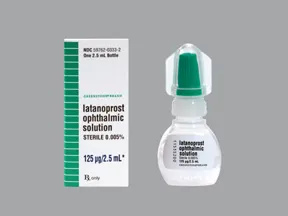
latanoprost 0.005 % eye drops
Color: clearShape: Imprint:This medicine is a clear, clear, drops
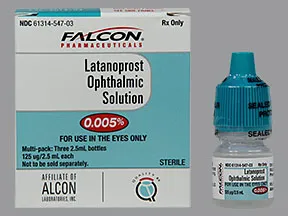
latanoprost 0.005 % eye drops
Color: colorlessShape: Imprint:This medicine is a clear, clear, drops
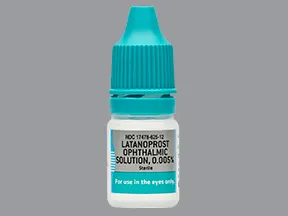
latanoprost 0.005 % eye drops
Color: colorlessShape: Imprint:This medicine is a clear, clear, drops
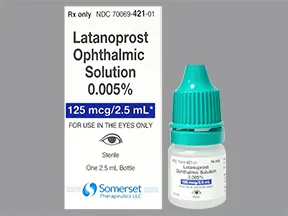
latanoprost 0.005 % eye drops
Color: colorlessShape: Imprint:This medicine is a clear, clear, drops
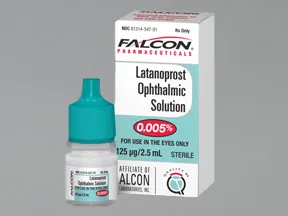
latanoprost 0.005 % eye drops
Color: colorlessShape: Imprint:This medicine is a clear, clear, drops
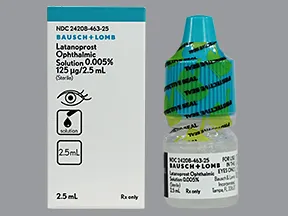
latanoprost 0.005 % eye drops
Color: colorlessShape: Imprint:This medicine is a clear, clear, drops
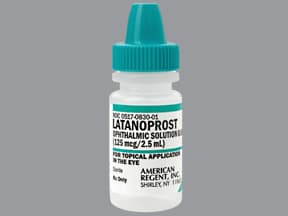
latanoprost 0.005 % eye drops
Color: colorlessShape: Imprint:This medicine is a clear, clear, drops
Are you currently using Latanoprost Drops?
This survey is being conducted by the WebMD marketing sciences department.
Selected from data included with permission and copyrighted by First Databank, Inc. This copyrighted material has been downloaded from a licensed data provider and is not for distribution, except as may be authorized by the applicable terms of use.
CONDITIONS OF USE: The information in this database is intended to supplement, not substitute for, the expertise and judgment of healthcare professionals. The information is not intended to cover all possible uses, directions, precautions, drug interactions or adverse effects, nor should it be construed to indicate that use of a particular drug is safe, appropriate or effective for you or anyone else. A healthcare professional should be consulted before taking any drug, changing any diet or commencing or discontinuing any course of treatment.